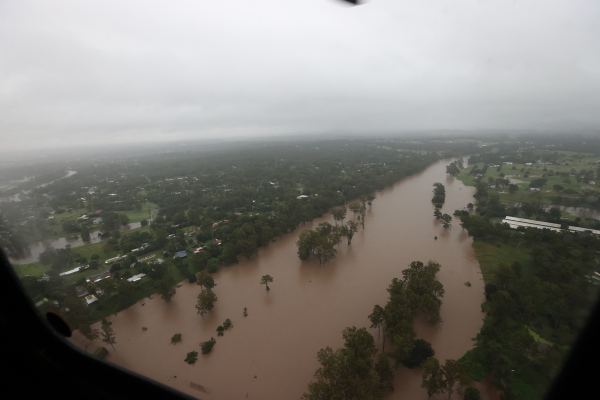DVA staff help with flood relief
Following the recent floods in southern Queensland and northern NSW, a number of DVA staff volunteered to help non-government organisations (NGOs) deal with the aftermath. The department supported them in this, recognising the value of volunteering for the broader community benefit.
Two examples are Mark Kalleske, a DVA staffer based in Canberra, and Craig Turnbull, a Community and Peer Advisor with Open Arms – Veterans & Families Counselling, based in Brisbane.
In mid-March, Mark spent five days in the town of Murwillumbah. It was his seventh deployment as an emergency services volunteer.
Murwillumbah was devastated when the Tweed River broke its banks and inundated much of the town, which remained cut off for five days.
When Mark arrived, much of the town centre had been cleaned up although surrounding areas remained devastated. People were visiting the recovery centre seeking help. He welcomed people on arrival, provided immediate support and connected them with the help they needed.
‘I have a good understanding of government and reasonably honed listening skills that I have picked up working in various agencies over the years,’ says Mark. ‘Listening to people and helping them navigate the ‘system’ and connect to services is important. Most people don’t care what agency is providing the service; just that they get the help they need when they need it.’
The kind of work he and other volunteers do often makes a real difference.
‘One person arrived very upset and angry,’ says Mark. ‘They were unemployed and wanted to know why there was a recovery centre set up for people made homeless by the floods when they had been homeless for years. After listening to their story, which included being brought up in a veteran household, I connected the individual with a couple of services that could help. After an hour and a half, they came out a different person. A couple of days later, I received a call from the chaplain that the person had commenced as a volunteer helping those in need. Often people just need someone to sit down with and hear some words of hope to light the spark.’
Craig meanwhile spent several days on Queensland’s Gold Coast, just north of the NSW border, and in the Moreton Bay region, just north of Brisbane. He deployed with Disaster Relief Australia (DRA).
‘It was my first deployment with DRA,’ says Craig. ‘Soon after arriving, I supported their welfare team, which involved working with people who were very distressed, providing support, putting them in touch with Open Arms. Often it involved just listening.’
His role was very similar to his job as an Open Arms Community and Peer Advisor.
‘As an Open Arms Peer I act as a guide post for veterans. We can tap them into work, education, communities. For people who’ve transitioned, they often want a like-minded community that replicates the Defence Force. So we put them in touch with a suitable organisation and often that’s DRA.’
Craig became an Open Arms Peer six months ago after meeting other Peers at a charity event. Peers draw on their own lived experiences from the military and mental health service system when working with clients. Craig, for instance, was in the Army for 20 years, spending most of that time as a dog-handler with the Royal Australian Engineers.
You can find out more about the Community and Peer program on the Open Arms website.

